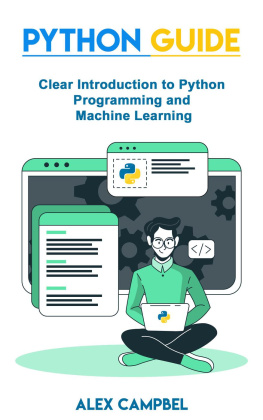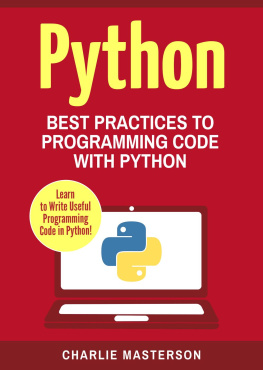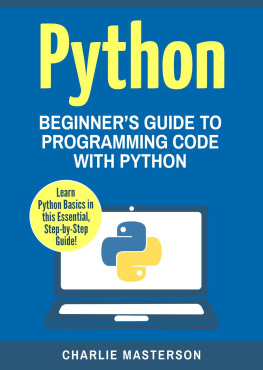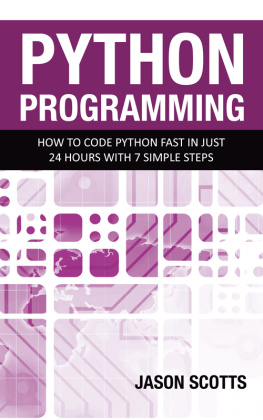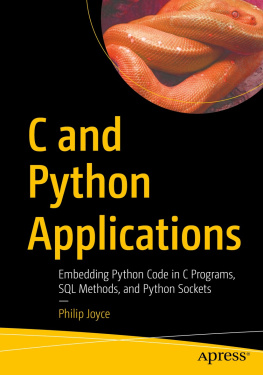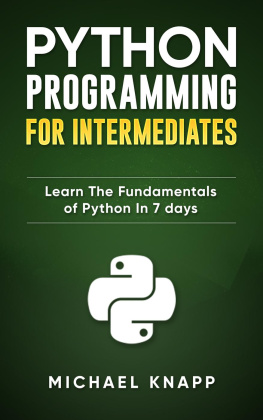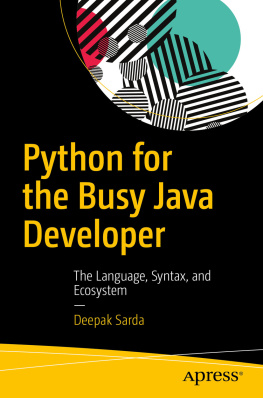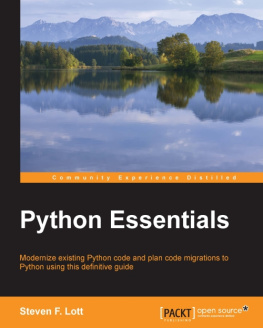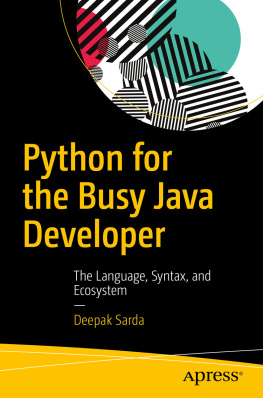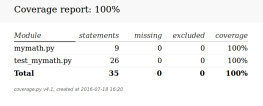Title Page
The Python Apprentice
A Practical and Thorough Introduction to the Python Programming Language
Robert Smallshire
Austin Bingham
BIRMINGHAM - MUMBAI
Copyright
The Python Apprentice
Copyright 2017 Robert Smallshire, Austin Bingham
All rights reserved. No part of this book may be reproduced, stored in a retrieval system, or transmitted in any form or by any means, without the prior written permission of the publisher, except in the case of brief quotations embedded in critical articles or reviews.
Every effort has been made in the preparation of this book to ensure the accuracy of the information presented. However, the information contained in this book is sold without warranty, either express or implied. Neither the authors, nor Packt Publishing, and its dealers and distributors will be held liable for any damages caused or alleged to be caused directly or indirectly by this book.
Packt Publishing has endeavored to provide trademark information about all of the companies and products mentioned in this book by the appropriate use of capitals. However, Packt Publishing cannot guarantee the accuracy of this information.
First published: June 2017
Production reference: 1160617
Published by Packt Publishing Ltd.
Livery Place
35 Livery Street
Birmingham
B3 2PB, UK.
ISBN 978-1-78829-318-1
www.packtpub.com
Credits
Authors Robert Smallshire Austin Bingham | Technical Editor Joel Wilfred D'souza |
Acquisition Editor Frank Pohlmann | Indexer Rekha Nair |
Project Coordinator Suzanne Coutinho | Layout Coordinator Deepika Naik |
About the Authors
Robert Smallshire is a founding director of Sixty North, a software consulting and training business in Norway providing services throughout Europe, and which uses Python extensively. Robert has worked in senior architecture and technical management roles for several software companies providing tools in the energy sector. He has dealt with understanding, designing, advocating and implementing effective architectures for sophisticated scientific and enterprise software in Python, C++, C# and F# and Javascript. Robert is a regular speaker at conferences, meetups and corporate software events and can be found speaking about topics as diverse as behavioural microeconomics in software development to implementing web services on 8-bit microcontrollers. He is organiser of the Oslo Python group and holds a Ph.D. in a natural science.
Austin Bingham is a founding director of Sixty North, a software consulting, training, and application development company. A native of Texas, in 2008 Austin moved to Stavanger, Norway where he helped develop industry-leading oil reservoir modeling software in C++ and Python. Prior to that he worked at National Instruments developing LabVIEW, at Applied Research Labs (Univ. of Texas at Austin) developing sonar systems for the U.S. Navy, and at a number of telecommunications companies. He is an experienced presenter and teacher, having spoken at numerous conferences, software groups, and internal corporate venues. Austin is also an active member of the open source community, contributing regularly to various Python and Emacs projects, and he's the founder of Stavanger Software Developers, one of the largest and most active social software groups in Stavanger. Austin holds a Master of Science in Computer Engineering from the University of Texas at Austin.
www.PacktPub.com
For support files and downloads related to your book, please visit www.PacktPub.com .
Did you know that Packt offers eBook versions of every book published, with PDF and ePub files available? You can upgrade to the eBook version at www.PacktPub.com and as a print book customer, you are entitled to a discount on the eBook copy. Get in touch with us at service@packtpub.com for more details.
At www.PacktPub.com , you can also read a collection of free technical articles, sign up for a range of free newsletters and receive exclusive discounts and offers on Packt books and eBooks.

https://www.packtpub.com/mapt
Get the most in-demand software skills with Mapt. Mapt gives you full access to all Packt books and video courses, as well as industry-leading tools to help you plan your personal development and advance your career.
Why subscribe?
- Fully searchable across every book published by Packt
- Copy and paste, print, and bookmark content
- On demand and accessible via a web browser
Customer Feedback
Thanks for purchasing this Packt book. At Packt, quality is at the heart of our editorial process. To help us improve, please leave us an honest review on this book's Amazon page at www.amazon.com/dp/ 1788293185 .
If you'd like to join our team of regular reviewers, you can e-mail us at customerreviews@packtpub.com. We award our regular reviewers with free eBooks and videos in exchange for their valuable feedback. Help us be relentless in improving our products!
Table of Contents
Preface
Welcome to The Python Apprentice! Our goal with this book is to give you a practical and thorough introduction to the Python programming language, providing you with the tools and insight you need to be a productive member of nearly any Python project. Python is a big language, and its not our intention with this book to cover everything there is to know. Rather we want to help you build solid foundations, orient you in the sometimes bewildering universe of Python, and put you in a position to direct your own continued learning.
This book is primarily aimed at people with some experience programming in another language. If you're currently programming in any of the mainstream imperative or object-oriented languages like C++, C#, or Java, then you'll have the background you need to get the most out of this book. If you have experience in other types of languages for example, functional or actor-based then you may have a bit steeper learning curve with Python, but you won't encounter any serious difficulties. Most programmers find Python very approachable and intuitive, and with just a little practice they quickly become comfortable with it.
On the other hand, if you don't have any experience with programming this book may be a bit daunting. You'll be learning not just a programming language but many of the topics and issues common to all languages at the same time. And to be fair, we don't spend a lot of time trying to explain these areas of "assumed knowledge". This doesn't mean you can't learn from this book! It just means that you might have to work a bit harder, read sections multiple times, and perhaps get guidance from others. The reward for this effort, though, is that you'll start to develop the knowledge and instincts for approaching other languages, and this is a critical skill for the professional programmer.
In this first chapter we'll take a quick tour of the Python language. We'll cover what Python is (hint: it's more than just a language!), take a look at how it was and still is developed, and get a sense of what makes it so appealing to so many programmers. We'll also give a brief preview of how the rest of the book is structured.


